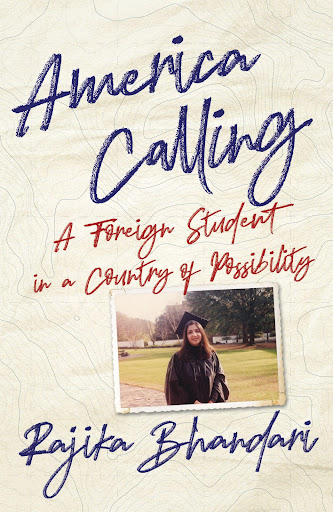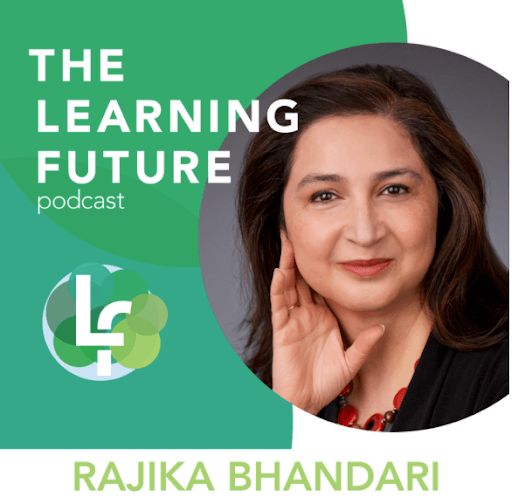Dr. Rajika Bhandari’s memoir speaks to millions learning in post-9/11 US
 Irvington, NY – Author Rajika Bhandari, a sought-after thought leader on cultural diplomacy, shares her personal education and immigration experience in “America Calling: A Foreign Student in a Country of Possibility” (Sept. 14, 2021, She Writes Press) that Kirkus Reviews calls “a valuable study of an extremely important area of ‘soft diplomacy,’ dispelling all sorts of easy and false assumptions.” Bhandari’s memoir speaks to the experiences of millions of international students, including many Silicon Valley entrepreneurs and Nobel Prize winners, who navigate the convoluted education-to-immigration system in America and the expectations of American cultural assimilation.
Irvington, NY – Author Rajika Bhandari, a sought-after thought leader on cultural diplomacy, shares her personal education and immigration experience in “America Calling: A Foreign Student in a Country of Possibility” (Sept. 14, 2021, She Writes Press) that Kirkus Reviews calls “a valuable study of an extremely important area of ‘soft diplomacy,’ dispelling all sorts of easy and false assumptions.” Bhandari’s memoir speaks to the experiences of millions of international students, including many Silicon Valley entrepreneurs and Nobel Prize winners, who navigate the convoluted education-to-immigration system in America and the expectations of American cultural assimilation.
Growing up in middle-class India, Bhandari watched as generations of her family looked westward, where an American education meant status and success. She initially resists the lure but finds herself heading to a US university to study, following her heart and a relationship.
When that relationship ends and she fails in her attempt to move back to India as a foreign-educated woman, she returns to the US and finds herself in a job where the personal is political and professional: she’s immersed in the lives of international students who come to America from over 200 countries, the universities that attract them, and the tangled web of immigration these students must navigate.
An unflinching, insightful narrative that Midwest Book Review says “offers a view of not just international students’ lives (and especially Indian experiences), but how they live and what these students choose after achieving their educational goals.” America Calling is a deeply personal story of Bhandari’s search for place and voice, and an incisive analysis of America’s relationship with the rest of the world through the most powerful tool of diplomacy: education.
“America Calling: A Foreign Student in a Country of Possibility”
Rajika Bhandari | September 14, 2021 | She Writes Press
Paperback | 978-1647421830 | $16.95
Memoir/Non-fiction
 Rajika Bhandari: A former international student from India to the US and an Indian American immigrant, Rajika Bhandari is an international higher education expert, a widely published author, and a sought-after speaker on issues of international education, skilled immigrants, and educational and cultural diplomacy.
Rajika Bhandari: A former international student from India to the US and an Indian American immigrant, Rajika Bhandari is an international higher education expert, a widely published author, and a sought-after speaker on issues of international education, skilled immigrants, and educational and cultural diplomacy.
An author of five academic books and one previous nonfiction book, Dr. Bhandari is quoted by dozens of global media outlets each year, including The New York Times, The Washington Post, The Wall Street Journal, NPR, The Times of India and Quartz, and her writing has appeared in The Guardian, The Chronicle of Higher Education, HuffPost, University World News, Times Higher Education, and The Diplomatic Courier, among others. She lives outside New York City. Website: www.rajikabhandari.com
Advance Praise for “America Calling”
“In adding her voice to the immigrant experience, Rajika reminds us that everyone has a story to tell and that everyone’s story counts. It is books like this that make America a kinder and wiser nation. Highly recommended for high schools and colleges.”
—Firoozeh Dumas, New York Times best-selling author of Funny in Farsi: A Memoir of Growing up Iranian in America
“Rajika Bhandari is a voice that urges us with moral clarity and rigorous intelligence to embrace immigrants in higher education. This book tells a personal story and a wider one too, it’s a clarion call for the nation’s policy makers and educators, to welcome into the nation’s ranks any and all curious minds willing to join in the pursuit of an education.”
—Maeve Higgins, New York Times columnist, award-winning author of Maeve in America: Essays by a Girl from Somewhere
“In America Calling, Rajika Bhandari captures the confusion and wonder of the international student experience of the sort she, I, and many others have shared. Sometimes funny, often moving, and always thought-provoking, Dr Bhandari’s is a memorable story, and an enjoyable read.”
—Shashi Tharoor, Indian political leader, former Under-Secretary General of the United Nations, and best-selling author of 22 books including India: From Midnight to the Millennium and Beyond
“Rajika presents a very personal and fascinating story of the trials and tribulations of a foreign student coming to the U.S. She explains why the world’s brightest flock to American shores and boost its competitiveness—and why they are now returning home. She is right that if America doesn’t correct the exodus, it will be the greater loser.”
—Vivek Wadhwa, Distinguished Fellow, Harvard Law School, Labor and Worklife Program, best-selling author of The Immigrant Exodus: Why America is losing the global race to capture entrepreneurial talent
“Through this intimate account of her own journey, Rajika Bhandari tells the story of the millions of young people who pursue the dream of an American education, the price they pay, the irreversible transformation they undergo, and the often misunderstood, under-appreciated, yet immense social and economic value they bring about. While she grew up in Delhi and I in Madrid, her story is, in many ways, mine too.”
—Angel Cabrera, Former President, George Mason University; President, Georgia Tech and a Carnegie Corporation “Great Immigrant”
“Rajika Bhandari offers a roadmap to the many who have come, and the many who will be drawn to America, in search of educational and other life-affirming professional opportunities. It is deeply personal and yet fully illustrative of the many shared experiences of generations that continue to enrich a nation built by and for immigrants.”
—Raju Narisetti, founder of Mint newspaper, and former Managing Editor at The Washington Post and The Wall Street Journal
“Seeking an international education takes courage, as Cervantes reminds us. But it’s not a quixotic venture. As Dr Bhandari ‘s story illustrates, the windmills of the mind can be overcome, and the arc of educational exchange bends toward open doors and open minds.”
—Allan E. Goodman, President and CEO, Institute of International Education (IIE)
”An Indian woman’s wonderfully written, illuminating account… a valuable study of an extremely important area of “soft diplomacy,” dispelling all sorts of easy and false assumptions. Bhandari’s informative memoir is for readers who want to understand how interconnected the world really is. Bhandari is a very talented writer, knowing that in a sea of data there is no better life raft than the telling anecdote.” —Kirkus Reviews
“In these times, when vociferous politicians promote isolation and nativism by vilifying immigrants, including the highly educated, Rajika Bhandari presents a bold counter-narrative, sharing her deeply personal and eye-opening insights into the trials and tribulations of international students in America–and the great value they bring to the entire country.”
–Helen Zia, activist and author of Asian American Dreams and The Last Boat out of Shanghai: The Epic Story of the Chinese who Fled Mao’s Revolution
“America Calling is a timely and unique addition to immigrant literature. Bhandari weaves an evocative and compelling narrative of the power of education to connect and transform—experience that resonates deeply with me as a first-generation immigrant and college student.”
–Reyna Grande, award-winning author of A Dream Called Home and The Distance Between Us
“Anyone who has wondered about the modern immigrant experience and perceptions of coming to this nation to fulfill dreams will find America Calling: A Foreign Student in a Country of Possibility a lesson in adaptation, advantage, and revised futures by those who come to this country as students.”
— Midwest Book Review
Media Buzz for Rajika Bhandari and America Calling

“What the American dream looks like for immigrants” – Vox

“Is the U.S. Saying ‘No Thanks’ to the World’s Best and Brightest?” – Ms. Magazine

“Fitting in but retaining your identity: respecting diversity does not mean forsaking the identity and culture that one is born with. Finding the right balance between your unique cultural heritage and common American values is the best of both worlds.” – Authority Magazine

“about the international student experience with all its wonder, confusion, and loneliness” – The Book Slut
 Also featured on
Also featured on
The Learning Future Podcast
Nortre Dame Counselors’ Summer Reading List
Thrive Global
The Bronx Daily
In an interview, Rajika Bhandari can discuss:
- At a time of growing nationalism, a turning inward, and fear of the “other,” how “America Calling” is ultimately a call to action to keep America’s borders and minds open
- The concept of the American Dream and its connection to education
- The first examination of the pathway between education and immigration in the US, tracing the steps from higher education to immigration in the country as US colleges and universities are one of the biggest “feeders” of immigrants
- Why losing international students would mean losing the country’s competitive and innovative edge over the rest of the world
- Unique struggles of immigrating to the US, especially as a student
- The memoir’s theme of dislocation, the process of cultural learning and assimilation
- Understanding and defining “home”
- Education as a pathway to female empowerment and personal transformation, as Bhandari bucked patriarchal traditions to becoming a global expert in higher education and a single mother by choice
- Intersectionality from the perspective of an immigrant woman of color — what it means to be an Asian American woman at a time of growing hatred against Asians in America
- The journey of some of America’s most famous entrepreneurs and leaders who came to the country as international students — including the cofounder of Moderna (which spearheaded the development of the COVID-19 vaccine) and CEO of Google
- What the election of America’s first Indian and Black female Vice President, whose mother came to the US as an international student from India, means for Indian women following a similar path
- 2021 marking the 20th anniversary of 9/11, when Americans began to view international students with suspicion
- The book’s publication during Welcoming Week, and Bhandari’s thoughts on the state of affairs during International Education Week from Nov. 15-21
An Interview with Rajika Bhandari
While we know this story is a personal one, what motivated you to write this book at this time?
I have worked in the field of international education for many years and during this time came to realize how little the American public knows about international students — who they are, where they come from, what are their experiences. Yet there are over 1 million such individuals from over 200 countries who study in the US. There is no broader understanding of the value that such individuals bring to American society and yet they are presented with educational and immigration hurdles every step of the way.
I wanted to write this book to reveal the experience of an international student in the US and make people sit up and take notice that the future of America is at risk if the world stops coming to American colleges and universities. These issues became even more urgent over the past five years under the Trump administration, when there was an onslaught of damaging proposals — including the infamous travel bans — which made America feel very unwelcome to international students. As someone who had watched this from the sidelines, albeit as an expert, I knew I had to speak up and share my story and that of others on what being an international student and future immigrant feels like.
Your story speaks intimately on the education-to-immigration process many international students go through while planning their futures beyond academics. Why was it important for you to speak to this process?
There are a lot of misunderstandings about this process, with many in America believing that it is easy for international students to stay on, or that it is easy for someone to become a skilled immigrant in America. The reality and evidence point to the opposite, where the process, wait times, and immigration loopholes are dehumanizing and damaging — both for that student who aspires to stay on, but also for the US as a country which, each year, loses a ton of global talent that leaves the country and goes elsewhere because of the inability to stay. While much of the country’s focus has been on undocumented immigrants and their challenges — which are of course critical — the harrowing ordeal of those pursuing the pathway of immigration through employment does not receive as much attention.
What do you want readers to take away from your story?
Even for those Americans who know international students and work closely with them, they haven’t been in their shoes and therefore cannot understand what it really feels like to leave home, to have your entire world upended, and to land in a country where everything is different — the language, the food, and even how students are taught to think and learn.
I want the book to be a glimpse into the lives of these students and potential future immigrants, to add a face and voice to their stories. I want Americans to understand how important their colleges and universities have been in connecting them to the rest of the world. America is a beacon for many and that’s why this give-and-take needs to be protected by keeping the doors open to young students from around the world. If it were not for this type of exchange, the US would not have a Kamala Harris, a Barack Obama, or writers like Chimamanda Ngozi Adichie.
Does the process of cultural learning and assimilating differ with students vs. other immigrants? What are some of the unique challenges faced by immigrants, especially as it relates to education?
The fundamental sense of displacement and assimilation is a shared experience for all immigrants, but there is a unique aspect to arriving in a country as a young student. It is a coming-of-age time in a person’s life when one’s basic values, ideas and beliefs are being shaped. To be exposed to a different culture and context during these foundational years can have a huge impact on a person’s life — I know it did in mine.
Moreover, the approach to education is so different across countries that being in an American classroom teaches future immigrants about American society, culture and how to think in the American way that is different from any other immigrant experience. Yet there can be unique challenges: students coming from other countries — especially Asian countries — are not taught to think critically and to question authority and hence struggle with the open culture of an American classroom.
How has the international student experience evolved in the 20 years since 9/11, now in a post-Trump era, Covid-stricken era with America’s first Indian and Black female Vice President whose parents came here as international students?
9/11 was a difficult time for international students in the US because it was the first time that they were equated with terrorists (one of the hijackers was previously on a student visa). But that moment passed, and the next decade was a golden period both for international students who came to the US in increasing numbers — eventually reaching over 1 million — and for American society, which reaped the economic, social and cultural benefits of these global migrants.
But then Trump was elected, and things got worse. After a four-year period where the US has lost its status in the eyes of the world and where the numbers of students coming to the US have plummeted both due to bad immigration policies and COVID-19, there is finally a glimmer of hope with the Biden-Harris administration. There is a clear “Biden Bump” and students around the world are again beginning to look to the US with a sense of optimism. Future international students see themselves reflected in Kamala Harris and her legacy. If the COVID-19 crisis is contained, there are all signs that the US is on track to see a huge rebound in students coming to the US.
The voices you highlight in the book are so impressive and inspiring. How did you choose who to interview and go about your writing process?
I see the book as a way of telling not just my story but also those of others whose lives and experiences speak to the impact that studying in America has had on them, and who themselves have had a profound impact on the US and its ties with the world.
I sought out well-known individuals like Ambassador Richard Verma, the first person of Indian American origin to serve as an ambassador to India under President Obama, and whose own father arrived in the U.S in 1963 as an international student from India with just $14 in his pocket. I tell the story of Susan Mboya, whose father along with John F. Kennedy, launched the “African Airlift” which brought over 800 African students to the US in the 1960s, including the senior Barack Obama.
I thought it important to also tell the stories of everyday people and young global dreamers–a young female student from China who came to believe anything was possible in America when landing an internship with Ivanka Trump; a refugee fleeing Syria to come to an American university offering him a safe haven and a new life; and an Indian student whose experience during the Black Lives Matter movement helped him and his friends confront their own racial stereotypes.
I do also tell the stories of those who America has pushed away and whom the country has lost: a brilliant young scientist and team at Monash University in Australia that is doing cutting-edge work in gravitational wave astronomy (the field that won the Nobel Prize in 2017) but that was forced out of the US because of visa issues. Capturing these narratives helped me show the full arc of America’s relationship to the world through education: the history of such relationships going back to the late 1800s, to my own experience, and then to the current view and what is happening today.

A former award-winning journalist with national exposure, Marissa now oversees the day-to-day operation of the Books Forward author branding and book marketing firm, along with our indie publishing support sister company Books Fluent.
Born and bred in Louisiana, currently living in New Orleans, she has lived and developed a strong base for our company and authors in Chicago and Nashville. Her journalism work has appeared in USA Today, National Geographic and other major publications. She is now interviewed by media on best practices for book marketing.

